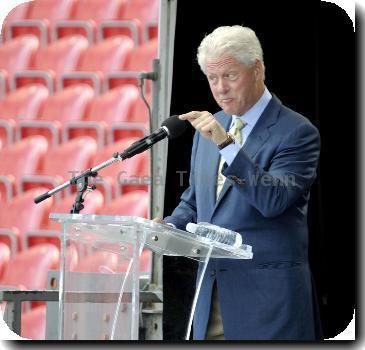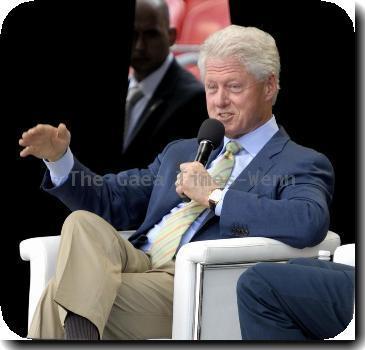Report: US missionary arrives in China after being freed by North Korea
By Jean H. Lee, APFriday, February 5, 2010
Report: US missionary arrives in China from NKorea
SEOUL, South Korea — A news report says an American missionary has arrived in China after being freed by North Korea.
The brief report Saturday by South Korea’s Yonhap news agency did not provide any further details.
On Friday, North Korea announced it would free Robert Park, saying he had shown “sincere repentance” for entering the country illegally on Christmas Day.
Park, 28, slipped across the frozen Tumen River from China into North Korea carrying letters calling on leader Kim Jong Il to close the country’s notoriously brutal prison camps and step down from power — acts that could risk a death sentence in the totalitarian nation.
THIS IS A BREAKING NEWS UPDATE. Check back soon for further information. AP’s earlier story is below.
SEOUL, South Korea (AP) — A “repentant” American missionary set to be freed from North Korea after being arrested at the border on Christmas said he was ashamed of the “biased” view he once held of the communist nation, Pyongyang’s state media said Friday. There was no way to verify if the missionary was speaking freely or under duress from his captors.
Breaking its silence about Robert Park’s fate, North Korea announced Friday that the American would be released from custody after admitting to entering the country illegally and showing “sincere repentance” for the transgression.
Park, 28, slipped across the frozen Tumen River from China into North Korea carrying letters calling on leader Kim Jong Il to close the country’s notoriously brutal prison camps and to step down from power — acts that could risk a death sentence in the totalitarian nation.
However, the government “decided to leniently forgive and release him, taking his admission and sincere repentance of his wrong doings into consideration,” the official Korean Central News Agency said. Details of his release were not immediately available.
Park, 28, of Tucson, Arizona, appeared healthy if a bit gaunt in photos released by KCNA during what it called an interview with the American. Dressed in a dark suit and tie, he smiled and gesticulated in the photos, a microphone and bottles of water on the table before him.
Back home, his family exulted at the prospect of Park’s release.
“We are very excited but I don’t know if it’s real or not. We have to wait and see if it’s really happening,” his father, Pyong Park, told The Associated Press by telephone from his home in Carlsbad, California, north of San Diego.
In Tucson, the pastor who ordained Park as a missionary in 2007 said his congregation was “ecstatic” at news Park was safe. The Rev. John Benson and others said a rally set for Feb. 25 at the University of Arizona in Tucson to call for Park’s release may end up a homecoming party instead.
Benson was skeptical of Park’s statement, which he said sounded like “propaganda.” He said he’s never seen Park wear a suit, not even to a wedding, and won’t trust Park’s statements until he’s safely outside of North Korea.
“I want to hear Robert for himself,” he said.
In Washington, State Department spokesman P.J. Crowley said the timing of Park’s release was unclear. He said U.S. consular officials in Beijing are standing by to greet him upon arrival from Pyongyang.
“We expect him to travel today, and we will be standing by to offer whatever assistance he needs as he makes his way back to the United States,” Crowley said.
The spokesman said there was no U.S.-North Korea bargaining involved in the decision to release him.
“Other than requesting consular access to this individual, we’ve had no substantive discussions with North Korea,” Crowley said.
Park was detained nearly four months after two other Americans, journalists Euna Lee and Laura Ling, were released with former President Bill Clinton’s help after they were arrested at the border and sentenced to prison.
Late last month, KCNA reported the arrest of another American suspected of illegal entry. He has not been identified. Crowley said the U.S. has no information about that case.
The arrest of Americans in North Korea is a sensitive diplomatic issue since the United States, which fought against the North during the 1950-53 Korean War, does not have diplomatic relations with Pyongyang.
In recent weeks, the wartime rivals have reached out to one another. Washington is trying to get Pyongyang back to nuclear disarmament talks, while North Korea has pressed for a peace treaty to formally end the Korean War.
“Because negotiations are slowly beginning to gain momentum, North Korea wouldn’t have wanted to break the mood,” said Koh Yu-hwan, a North Korea expert at Dongguk University in Seoul. “Instead, they would have wanted to use this opportunity to improve their national image.”
KCNA said Park proposed being interviewed by the state-run news agency, and released what it said was a transcript of the interview. The interview has not been aired on state TV in North Korea, and could not be independently verified.
KCNA said Park told the news agency he felt compelled to go to North Korea to draw attention to reported rights abuses and mass killings, even if it meant risking his life.
North Korea is regarded as having one of the world’s worst human rights records, with some 154,000 political prisoners held in six camps across the country, according to the South Korean government.
Park reportedly said he expected to be shot by soldiers or thrown behind bars. But he said he had been fed “false propaganda made by the West to tarnish” North Korea’s image.
“I have never seen such kind and generous people,” he said, according to KCNA, reportedly describing his care as attentive and loving.
KCNA also said Park was surprised he was allowed to practice Christianity freely, and quoted him as saying he felt embarrassment and shame over what he considered a “biased view” of North Korea.
“What astonished me more was that a Bible was returned to me,” KCNA reported him as saying. “This fact alone convinced me that the religious freedom is fully ensured” in North Korea.
North Korea’s constitution guarantees freedom of religion but the government severely restricts religious observance, only allowing worship — primarily by foreigners — at sanctioned churches. Defectors say underground worship and the distribution of Bibles can mean banishment to a labor camp or execution.
An uncle, Manchul Cho, said the episode may promote a better understanding of the reclusive nation.
“Maybe Robert saw some really good future, which we haven’t seen,” Cho said in Los Angeles. “Maybe he can bring change over there and he can bring change over here.”
But Jo Sung-rae, of the Seoul-based activist group Pax Koreana, was skeptical of the KCNA report. He said Park told him he’d never wear the color black again, calling it a color “God does not like.”
“But Park appeared in the KCNA interview with a black tie. We believe this is his message to the world that he is being forced to act against his will,” he said at a Seoul rally.
Associated Press writers Elliot Spagat in San Diego, Walter Berry in Phoenix, and Kwang-tae Kim and Hongkeun Jeon in Seoul contributed to this report.
Tags: Arizona, Asia, Bill Clinton, California, China, East Asia, Geography, Greater China, North America, North Korea, Pyongyang, Religious Issues, Seoul, South Korea, Tucson, United States

